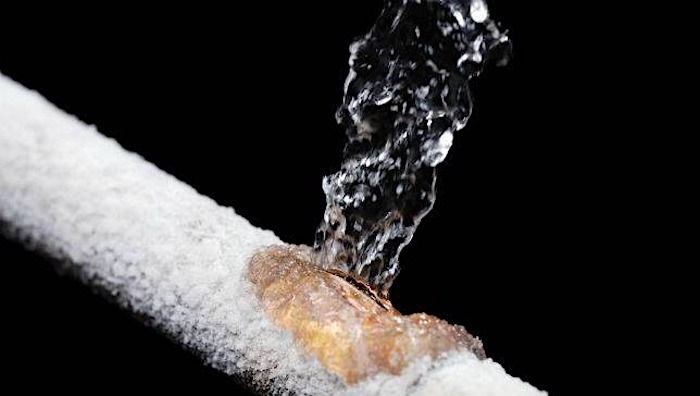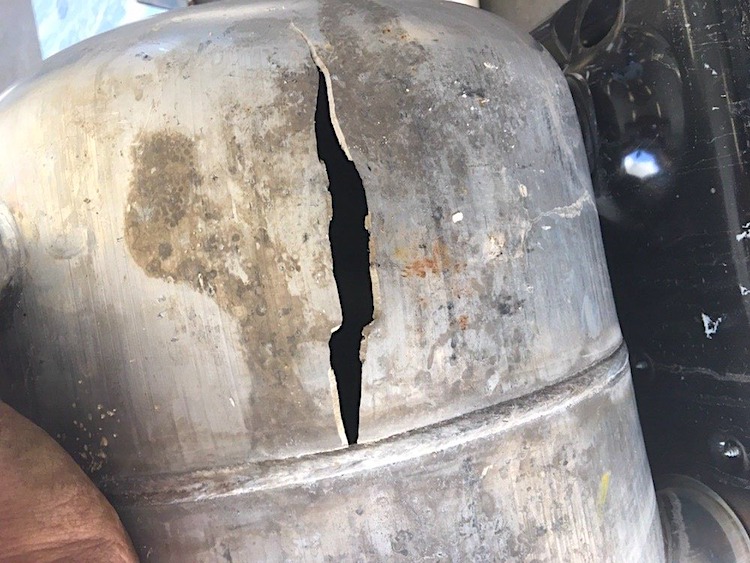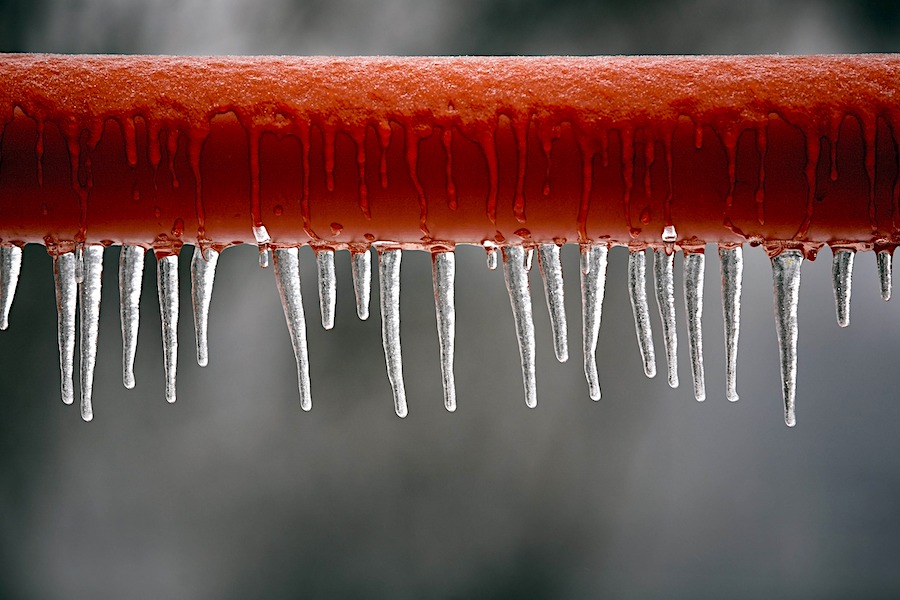Thanks for your support! If you make a purchase using our links in this article, we may make a commission. And, as an Amazon Associate, I earn from qualifying purchases. See the full disclosure here.
Before you make the decision to purchase an RV, you need to understand that there’s a lot of work you’ll need to do to maintain it. One problem that you might run into if you take it out in the winter months is your pipes freezing. So, how cold does it need to be before your RV pipes and tanks freeze?
Unfortunately, there isn’t a definitive temperature where you start to be at high risk for pipe freezes. There isn’t a temperature where your pipes will instantly freeze. Instead, your pipes freezing is very dependant on how long they remain in the cold. However, as a general rule of thumb, you should start to take precautions once the temperature goes below the freezing temperature of 32 degrees Fahrenheit or 0 degrees Celsius.
Getting into a situation where your RV pipes freeze isn’t an ideal one. In fact, it’s a situation that can be disastrous. As a result, you should take measures to ensure that this doesn’t happen. However, to take these measures you need to know what temperatures you need to start worrying about pipe freezes.
What Temperature Will RV Water Lines Freeze?
As we mentioned above, there isn’t a definitive temperature where your RV water lines will freeze. However, you definitely need to start to worry once the temperature gets below the freezing temperature of 32 degrees Fahrenheit or 0 degrees Celsius. At this point, there is a risk that your pipes could freeze.
Once the temperature gets below the freezing temperature, if your RV stays stationary and your pipes aren’t active, they will start to cool and eventually freeze. However, the colder it is the faster it will freeze.
As a rule of thumb, you shouldn’t wait until it gets below freezing temperature to take precautions. If you wait until it gets cold, you could get into a situation where you don’t have enough time to act. As a result, you should start to prepare for the winter months once the temperature gets to around 35 degrees Fahrenheit. This will give you ample time to prepare your pipes for the winter months. This way, you won’t risk being too late and your pipes won’t freeze.

How Long Does It Take for RV Water Lines to Freeze?
When the temperature drops to below freezing temperature, you are at risk of your pipes freezing. However, they won’t freeze instantly. Instead, it takes time for things to freeze. So, how long does it take?
That question is mostly dependant on how cold it is. If the temperature drops drastically to a temperature that’s a lot below the freezing temperature, your RV pipes will freeze much quicker. However, if the temperature drops to the freezing temperature precisely, you can expect it to take roughly 24 hours for your pipes to freeze. As a result, you will need to act fast so that they don’t freeze during this time.
That being said, this timeline could be decelerated if you have taken precautions beforehand such as installing insulation or heat tape.
Will RV Holding Tanks Freeze?

The next thing you’ll probably be worried about as an RV owner is whether your RV holding tank can freeze. Unfortunately, this is something that can definitely happen if you don’t take the proper precautions. Having your holding tanks freeze can result in a significant amount of damage that can be expensive to repair, so avoiding freezes is essential.
Your risk of a holding tank freeze is very dependant on the location of your holding tank in your RV. There are certain locations where a freeze is less likely or where a freeze will be delayed. For example, if your holding tank is above the floor level, it is much more difficult for it to freeze. This is because the ambient heat that comes from your interior furnace will help delay freezing. Since heat rises, when the heater is positioned below the holding tank, the ambient heat does more to prevent the holding tank from freezing.
Conversely, if your holding tank is positioned in the underbelly of your RV, it is at a much higher risk of freezing. The heat from your heater won’t do much to prevent it from freezing and it’s much more exposed to the elements. As a result, if you have an RV with a holding tank in this position, you need to be more prepared for the winter months. If you aren’t prepared, you’ll find yourself in a situation where key parts of your RV are no longer functional because of freezing, such as your holding tank.
Can an RV Water Heater Freeze?
Another thing you might be concerned about in the winter months is your RV water heater. If it’s turned on and there’s water in it, your RV water heater will not freeze. That’s because it’s actively generating heat, making it impossible for the temperature to get cold enough for the heater to freeze. However, your RV water heater might not be turned on at all times. As a result, there’s a risk that your RV water heater could freeze while it’s turned off.
If your RV water heater freezes, you’ll be left in a situation where you no longer have access to hot water. This can be disastrous for someone who lives in an RV. You won’t be able to take showers or do a number of other things that require hot water. Not only that, but your RV water heater freezing will result in damage to the heater itself. Repairing these damages can get expensive. As a result, you should take the precautions you need to take to avoid this situation.
Tips to Prevent RV Water Lines and Tanks from Freezing
So, you should know at this point that it’s possible for pretty much everything to freeze in the right circumstances. As a result, you need to take precautions to avoid freezing from happening. There are several things you can do to reduce your risk of freezing.
If you are going to park your RV for the winter you need to winterize it. Here is a great article and video from the RV Geeks about how to winterize your RV pipes.
If you plan to camp through the winter one of the most important things to do is to install and upgrade your RV insulation. Not only will insulation protect many components of your RV from freezing, but it will also help keep the living area in your RV warm. This is something you can do that will significantly improve your quality of life during the winter months.
Furthermore, you can use heat tape on your RV pipes to help stop them from freezing. You can place heat tape on the pipes and then add foam insulation to the pipes themselves. This will lower the temperature it needs to be for them to freeze.
Another thing you can do before the winter comes is to check to make sure that your RV furnace is working properly. The last thing you’d want is for winter to come and you find out that your furnace is broken. Additionally, having your furnace on will heat up all the components of your RV and help prevent them from freezing. This includes the RV pipes and tanks.
Enjoy Your RV in the Winter by Ensuring that Your RV Pipes and Tanks Don’t Freeze
After reading, we hope you have all the information you need to ensure that your RV pipes and tanks don’t freeze when the winter comes. We know that there’s a lot of information to absorb, but all of it is important for you. With this information, you should be able to take the proper precautions so that you never run into a situation where a component of your RV is frozen.
There are several things you can do to prevent your RV pipes and tanks from freezing. Firstly, you can bolster up your insulation. This will also help keep the living area in your RV warm. You can also apply heating tape to your RV pipes directly. By using heating tape along with foam insulation, you will significantly reduce the chance of your pipes freezing. You should also make sure that your furnace is working properly. By raising the temperature of your RV, you’re obviously lowering your chances of a freeze.
With all this information you should be prepared for your next winter trip in your RV. You’ll be able to relax, enjoy the beautiful winter view, and stay warm without worry.
Are you a new or experienced RV owner? Have you spent much time in your RV during the winter? Have you ever had your RV pipes or tanks freeze during the winter? Let us know in the comments!



We took our Winnebego to Idaho from California. Unfortunately, we did not realize we had to winterize and therefore it sat all winter. It did not have water in it. Well we just sold it and the new buyers put water in the tank just to have it leak all over the inside of the RV and out the door. It also appears no water pressure so pump must be damaged? Thoughts on how bad this could be and cost of repairs?
One additional tip…
For the city water line connection leave it loose so it fast drips where the line connects. This will allow the water to remain moving preventing freezing.
When leaving the RV in storage (tank/s empty) cover the lines coming from the fresh water tank-pump with a terry cloth towel. This will keep the direct cold air off the line/s preventing freezing if any water should remain.
Great information to know. I haven’t dewinterize yet, as i check out the weather for the week, i learned temperature will be below 30*s. I am off on the weekends only, will I have damage to the pipes, the gray and black tanks are empty. I have not emptied the heating tank. Am I good until the weekend?
We are wintering (3rd year) in western WA. We are currently finishing up a week long cold spell. The lows have been in the low 20’s and the highs in the mid 30’s. Two nights in a row it was 26 for 9 hours and under 30 for 14 hours. We have not skirted our rig. We’ve discussed it fo this year but can’t find the foam board (yet). We have a “4 seasons fifth wheel”, enclosed underbelly and have had no issues with frozen pipes. The only think I’ve done was to put two pieces of foam pipe around the pipes that lead to the kitchen sink (in the underbelly). The furnace is our primary heat source and does add some heat to the underbelly area. We also insulated our waterline with foam pipe covering (pool noodles work great) to the source and placed all of that into some 2 inch plastic pipe. We have covered the frost-less faucet with a plastic bag, an old rug piece, wraped in reflexic and covered the whole thing with a large plastic bag. The plastic bag is to keep the anticipated snow out of the faucet. We don’t expect to get cold enough to cause waste water or fresh water (half full just in case) to freeze during the remaining winter.
I live in Montana where cold weather can be legendary. Our state low is -70F verified on Rogers Pass on the Continental Divide. I put full -40F antifreeze in the Leprechaun when it gets down to 35F. Subsequently, no use of the gray tank, water pump, or fresh tank. Black tank we use but keep a close eye on the antifreeze in the tank, as well as the tank level. It’s best to keep the level low in winter so the frost dome doesn’t get so large it splits the tank. So dump your black tank often and keep plenty of blue or pink antifreeze handy and you’ll be fine all winter. It goes without saying that you will be keeping both eyes on the propane tank level.
What temperature do you need to keep the camper at during the night to prevent it from freezing? It is getting down in the 20’s tonight and we couldn’t get it winterized for a few days yet. Our water lines and hot water tank has been drained. We will have the propane heater on. We aren’t camping in it- just trying to keep it from freezing.
When we use our motorhome in the winter months we winterize the pipes, pack a couple of bottles of fresh water for drinking and cooking and a couple of bottles of the pink stuff (RV water line antifreeze) for flushing the toilet when necessary. Haven’t had a problem so far and try to make sure there’s more pink stuff than bodily fluids in the tank so it won’t freeze. We are in the mid-south so it doesn’t generally get below zero so we figure we’re pretty safe. It sure beats not being able to travel during the colder months. Nothing like a campfire and smores on a cold wintery evening. Would surely miss that if we didn’t “winterize” like we do.
Anyone else tried this approach? Any problems with it? Better ideas?
Hi Jim,
We have done the same thing so we can camp in the winter months and it works great!
Thanks for reading the article!
Mike
When a night freeze is possible, what temperature should we set the inside trailer temperature to prevent any freeze ups? We will winterize and store our MiniMax trailer in another week.
I camp year around but this winter I’m at a site where I’ll have to use the pump and portable water fresh water tank. My camper has the Arctic package. I skirted the camper with pink insulation boards. My concern is that the water tank, even though enclosed in the underbelly, could freeze. I can’t access the tank to add a heat source. This camper doesn’t have come with a heated tank option. Can’t flip a switch to add heat to tanks. I was thinking to put a heater under the camper enclosed within the skirting and turning it on when the temp gets 40 or below. Any suggestions? Does anyone else here camp full time and use their pump and fresh water throughout the winter?
Thank you
This was very helpful. I spoke to another a class owner who said they put a space heater under their RV when it cold. This worried me if that’s even safe
Thank you for all the great information
Hi Carolyn,
Glad you like the info we share!!!
Mike and Susan
I have a 2405 BH Coleman Light. It has a covered under belly. How can I insulate the pipes and the tanks? We like to winter camp. Will allowing the water to dip at night help prevent the pipes from freezing?
Hi Jerry,
Every camper is different but you need a heat source with a covered underbelly to keep the pipes warm. I don’t think letting the water drip at night is the answer…
Thanks for reading!
Mike
Where I get heat tape for my yRV
Check on Amazon or any Home Depot
Hi Mike,
I camp below freezing in my travel trailer. At home, I keep it plugged in with an oil-filled space heater. When I’m out, I keep heat on. I’m in AZ So we might get snow one night and warm up to 60 during the day. I’m usually in the low desert near Quartzsite.
Hi Dan,
Those desert temps can really change quickly and often!
Sounds like you have a good plan to me!
Thanks for your comment!
Just as an FYI – We started a new Facebook group that we are launching today called RV Camping for Newbies!
It’s a great place to ask questions and get great answers from your fellow RVers in the group!
We hope you’ll check it out!
Mike and Susan
https://www.facebook.com/groups/RVCampingforNewbies/